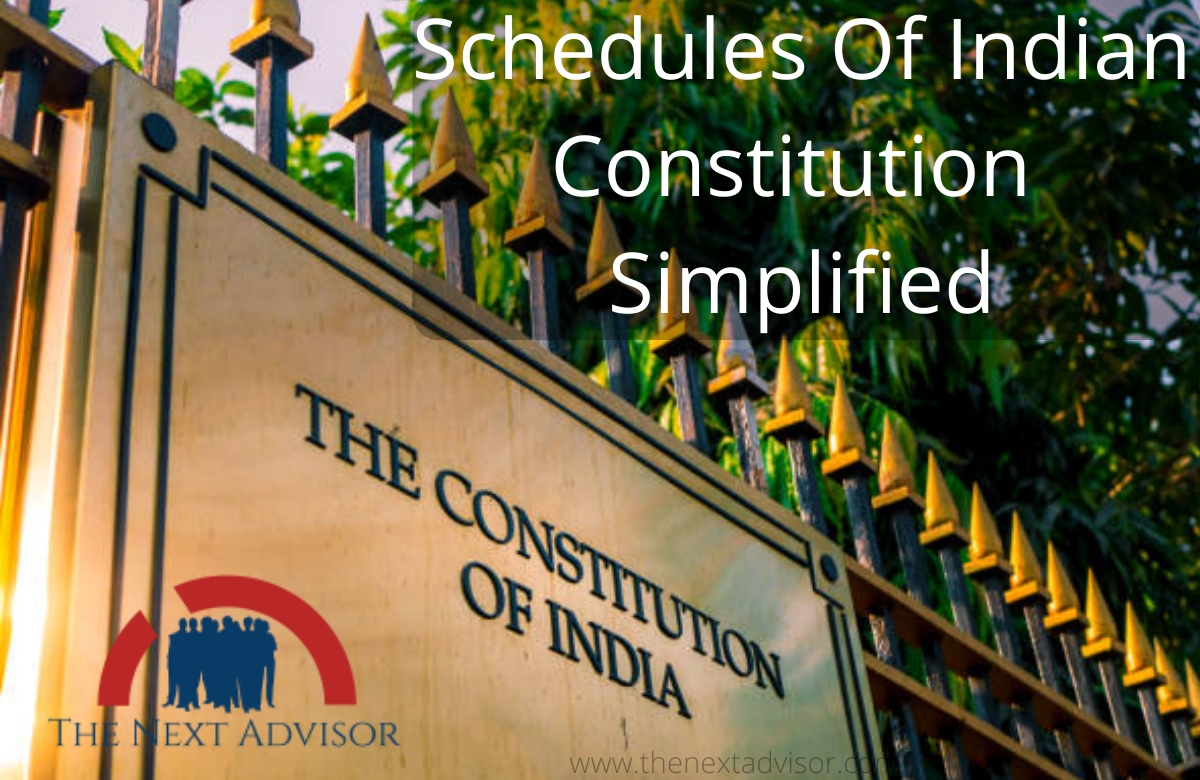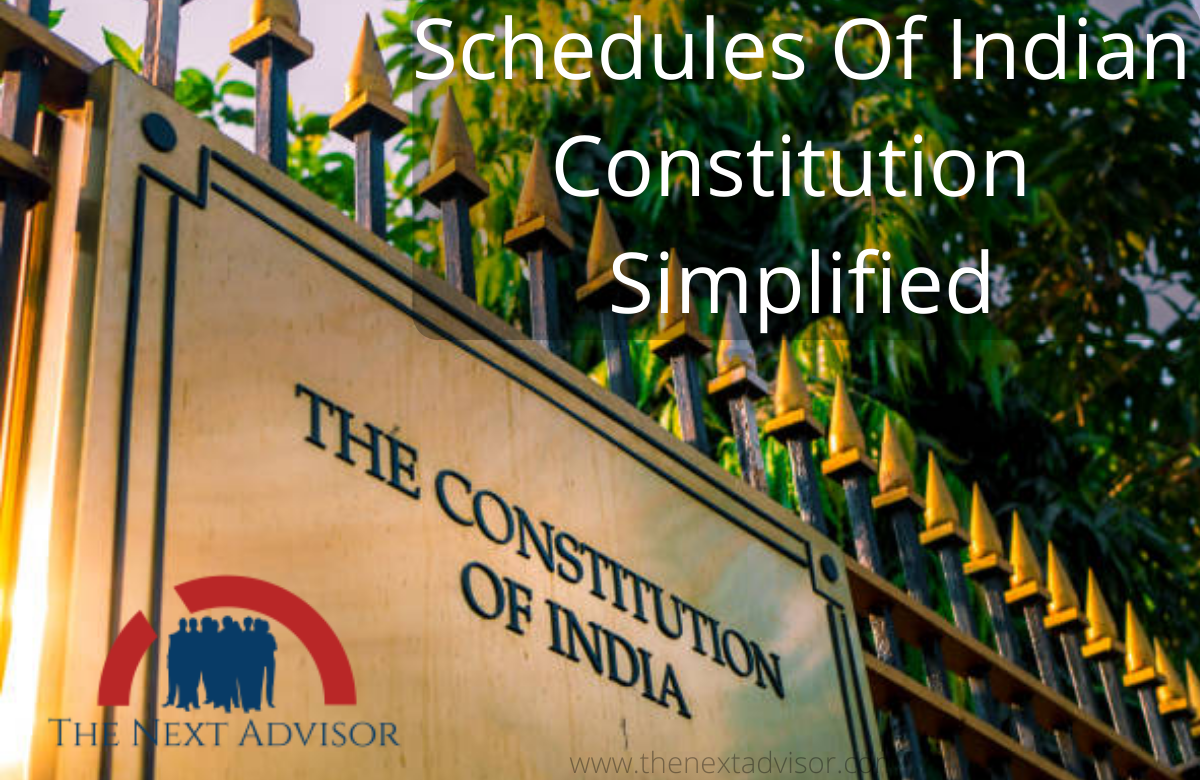INTRODUCTION of Schedules of the Indian Constitution
Schedules of the Indian Constitution give some important additional details. Schedules are basically tables that contain additional details not mentioned in the articles. There are 12 Schedules in the Constitution of INDIA India.
– One of the first mentions of Schedules was made in the Government of India Act, 1935 which is included 10 Schedules.
– Later, when the Indian Constitution was adopted in 1949, it consisted of 8 Schedules.
– Today, with the amendments in the Indian Constitution, there are a total of 12 Schedules.
OBJECTIVES OF PROVIDING SCHEDULE IN THE INDIAN CONSTITUTION
The objective of the schedule is to make the act’s provisions less complicated by separating the legal element from the additional information, making it more brief and easy to understand.
This division created by the timetable is also advantageous in the event of revisions. If there was no such separation, every time the additional information needed to be updated, an update to the article itself would be required, which is a time-consuming process. The schedules of the Indian constitution are utilized not just in the Indian Constitution, but also in a variety of laws for diverse purposes.
It is used to establish a list of states and union territories, as well as a list of other subject matters that fall under the jurisdiction of the state, the union, or both.
Schedules of the Indian Constitution can also be utilized when a certain section or article of legislation requires additional clarification or information not included in the main text.

Schedules Of Indian Constitution Simplified
VARIOUS SCHEDULES of the Indian Constitution
First Schedule of Indian Constitution- It contains the name of States and Union Territories. Territorial Jurisdiction of states is also included.
Second Schedule of Indian Constitution – The provisions in relation to allowances, privileges, emoluments of:
• President of India
• Governors of the Indian States
• Speaker of Lok Sabha & Deputy Speaker of Lok Sabha\
• Chairman of Rajya Sabha & Deputy Chairman of Rajya Sabha
• Speaker and Deputy Speaker of Legislative Assemblies of Indian State
• Chairman and Deputy Chairman of Legislative Councils of the Indian States.
• Supreme Court Judges
• High Court Judges
•Comptroller & Auditor General of Indi (CAG)
Third Schedule – It contains the forms of oath and affirmation for Union ministers of India, Parliament Election candidates, Members of Parliament (MPs) Supreme Court Judges, Comptroller and Author General, State Ministers, State Legislature Elections Candidates, State Legislature Members, & High Court Judges.
Fourth Schedule – It contains the provisions in relation to the allocation of seats for States and Union Territories in the Rajya Sabha.
Fifth Schedule.- It contains provisions in relation to the administration and control of scheduled areas and scheduled tribes.
Sixth Schedule – It contains provisions in relation to the administration of tribal areas in the states of Assam, Meghalaya, Tripura, and Mizoram.
Seventh Schedule –Article 246 of the Constitution confers legislative powers on the Parliament and the State Legislatures on the subjects enumerated in the Seventh Schedule. This schedule deals with the three legislative lists:
Union List- It is a list of 98 ( Originally 97 ) numbered items as provided in the Seventh Schedule. The Union Government or Parliament of India has exclusive power to legislate on matters relating to these items. State List-It is a list of 59 ( Originally 66 ) items. The respective state governments have exclusive power to legislate on matters relating to these items. Concurrent List – There are 52 (Originally 47) items currently on the list. This includes items that are under the joint domain of the Union as well as the respective States.
Eighth Schedule – It deals with the 22 official languages recognized by the Indian Constitution.
The Eighth Schedule to the Constitution consists of the following 22 languages: Assamese, Bengali, Gujarati, Hindi, Kannada, Kashmiri, Konkani, Malayalam, Manipuri, Marathi, Nepali, Oriya, Punjabi, Sanskrit, Sindhi, Tamil, Telugu, Urdu, Bodo, Santhali, Maithili, and Dogri. Of these languages, 14 were initially included in the Constitution. The Sindhi language was added by the 21st Amendment Act of 1967.
Konkani, Manipuri, and Nepali were included in the 71st Amendment Act of 1992. Bodo, Dogri, Maithili, and Santhali were added by the 92nd Amendment Act of 2003 which came into force in 2004.
Ninth Schedule – It deals with the state acts and regulations that deal with land reforms and the abolition of the zamindari system. It also deals with the acts and regulations of the Parliament dealing with other matters. 1st Amendment Act 1951 added the Ninth Schedule to protect the laws included in it from judicial scrutiny on the ground of violation of fundamental rights. However, in 2007, the Supreme Court ruled that the laws included in this schedule after April 24, 1973, are now open to judicial review.
Tenth Schedule- It contains provisions related to disqualification of the members of Parliament and State legislatures on the ground of defection. This schedule was added by the 52nd Amendment Act of 1985, also known as the Anti-defection Law.
• Grounds for disqualification:
■ If an elected member gives up his membership in a political party voluntarily.
■ If he votes or abstains from voting in the House, contrary to any direction issued by his political party.
■ If any member who is independently elected joins any party. If any nominated member joins any political party after the end of 6 months. Exceptions under the Anti Defection Law
■ In the situation where two-thirds of the legislators of a political party decide to merge into another party, neither the members who decide to join nor the ones who stay with the original party will face disqualification. Any person elected as chairman or speaker can resign from his party, and rejoin the party if he demits that post.
■ Earlier, the law allowed parties to be split, but at present, this has been outlawed.
■ Deciding Authority- Any question regarding disqualification arising out of defection is to be decided by the presiding officer of the House.
Eleventh Schedule- It contains the provisions that specify the powers, authority, and responsibilities of Panchayats. It has 29 matters. This schedule was added by the 73rd Amendment Act of 1992. This amendment implements the Article 40 of the DPSP which says that the ” State shall take steps to organize village panchayats and endow them with such powers and authority as may be necessary to enable them to function as units of self-government” and have upgraded them from non – justifiable to justifiable part of the constitution.
It has put a constitutional obligation upon states to enact the Panchayati Raj Acts as per provisions of Part IX. However, states have been given enough freedom to take their geographical, politico-administrative, and other conditions into account while adopting the Panchayati Raj System.
Twelfth Schedule It deals with the provisions that specify the powers, authority, and responsibilities of Municipalities. This schedule was added by the 74th Amendment Act of 1992. It has 18 matters including
■ Urban planning includes town planning.
■ Regulation of land use and construction of buildings. ( Municipality ).
■ Planning for economic and social development. Roads and bridges. Water supply for domestic, industrial, and commercial purposes, etc. ( Municipality )



























